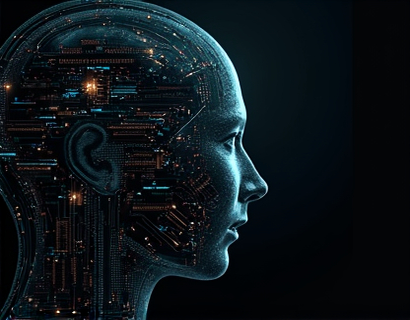Crypto and AI: Powering the Next Generation of Digital Engagement in the Ucosystem
The intersection of cryptocurrency and artificial intelligence (AI) is giving rise to a new era of digital engagement, transforming the way users interact with apps and services. This synergy is not just about combining two cutting-edge technologies but about creating a more intuitive, secure, and personalized digital experience. As we explore this dynamic landscape, it's essential to understand how these technologies are revolutionizing user engagement and driving growth in the tech industry.
The traditional digital ecosystem has been primarily driven by centralized platforms and algorithms. However, the integration of blockchain technology and AI is ushering in a decentralized and more transparent approach. Blockchain provides a secure and immutable ledger for transactions, while AI enhances the user experience through advanced analytics and machine learning. Together, they are paving the way for a more robust and interactive digital environment.
Enhanced Security Through Blockchain
One of the most significant advantages of using blockchain in digital engagement is enhanced security. Blockchain's decentralized nature ensures that data is not stored in a single point of failure, making it highly resistant to hacking and fraud. This is particularly crucial in an era where data breaches are becoming increasingly common. By leveraging blockchain, apps and services can offer users a higher level of trust and security, which is essential for building long-term relationships.
Smart contracts, a key feature of blockchain, automate and enforce contractual obligations without the need for intermediaries. This not only reduces costs but also minimizes the risk of human error. In the context of digital engagement, smart contracts can streamline user interactions, ensuring that transactions are executed precisely as intended. For instance, in gaming platforms, smart contracts can automatically distribute rewards to players based on predefined criteria, enhancing the overall user experience.
Personalization Through AI
AI plays a pivotal role in personalizing user experiences, making digital interactions more relevant and engaging. Machine learning algorithms analyze vast amounts of user data to identify patterns and preferences, allowing apps and services to tailor content and recommendations accordingly. This level of personalization is crucial in a crowded digital space where user attention is a scarce resource.
For example, streaming services use AI to curate playlists based on a user's listening history and preferences. Similarly, e-commerce platforms recommend products that align with a user's past purchases and browsing behavior. By integrating AI with blockchain, these platforms can ensure that personalization is not only effective but also secure and transparent. Users can have control over their data and choose how it is used, enhancing their trust in the service.
Decentralized Identity Management
Decentralized identity management is another area where blockchain and AI are making significant strides. Traditional identity verification processes are often centralized, vulnerable to breaches, and can be cumbersome for users. Blockchain-based identity solutions, enhanced by AI, offer a more secure and user-friendly approach.
Self-sovereign identity (SSI) is a concept where individuals have control over their digital identities, storing them in a secure wallet. AI can be used to verify and authenticate identities in real-time, reducing the need for multiple passwords and enhancing security. This not only simplifies the user experience but also empowers individuals to manage their digital presence more effectively.
Predictive Analytics for User Engagement
Predictive analytics, powered by AI, is revolutionizing how apps and services anticipate and respond to user needs. By analyzing historical data and real-time interactions, AI algorithms can predict user behavior with remarkable accuracy. This allows platforms to proactively engage users, offering them the right content at the right time.
For instance, a social media platform can use predictive analytics to determine when a user is most active and send notifications or recommendations during those periods. This not only increases user engagement but also improves the overall user experience. When combined with blockchain, these predictions can be made more reliable and transparent, as the data used for analysis is secure and tamper-proof.
Tokenization of Rewards and Incentives
Tokenization is a powerful mechanism for incentivizing user engagement, and when combined with blockchain and AI, it becomes even more effective. Tokens can represent various forms of value, such as points, currency, or access to premium features. AI can optimize the distribution and redemption of these tokens based on user behavior and platform goals.
For example, a fitness app can use AI to track a user's activity levels and reward them with tokens for reaching certain milestones. These tokens can then be redeemed for discounts on fitness gear or access to exclusive content. The use of blockchain ensures that the token economy is transparent and secure, fostering a more engaged and loyal user base.
Enhancing Trust Through Transparency
Trust is a critical factor in digital engagement, and blockchain and AI can significantly enhance transparency. Blockchain's immutable ledger provides a clear and verifiable record of all transactions and interactions, reducing the risk of fraud and manipulation. AI can further enhance this transparency by providing real-time insights and audits.
Users can see how their data is being used and how rewards are being distributed, building a sense of trust and fairness. This transparency is particularly important in industries where data privacy and security are paramount, such as healthcare and finance. By combining blockchain and AI, platforms can create a more trustworthy and user-centric environment.
Challenges and Considerations
While the potential of blockchain and AI in digital engagement is vast, there are several challenges that need to be addressed. Scalability remains a significant issue for blockchain technology, as many networks struggle to handle high volumes of transactions efficiently. However, ongoing developments in layer 2 solutions and cross-chain interoperability are addressing these concerns.
Another challenge is the regulatory landscape, which is still evolving in the realm of cryptocurrency and AI. Compliance with regulations is crucial to ensure that innovative solutions are adopted responsibly. Additionally, there is a need for education and awareness among users to fully leverage the benefits of these technologies.
Future Prospects
The future of digital engagement is bright, with blockchain and AI continuing to drive innovation and growth. As these technologies mature, we can expect even more sophisticated applications that further enhance user experiences. The integration of augmented reality (AR) and virtual reality (VR) with blockchain and AI is another exciting frontier, promising immersive and interactive digital environments.
Moreover, the rise of decentralized finance (DeFi) and non-fungible tokens (NFTs) is opening new avenues for engagement and monetization. These innovations are not only transforming the way we interact with digital assets but also creating new economic models that empower creators and users alike.
In conclusion, the synergy of cryptocurrency and AI is revolutionizing digital engagement, offering a more secure, personalized, and transparent user experience. As the tech landscape continues to evolve, the potential for further advancements is immense, paving the way for a more connected and engaging digital world.











































